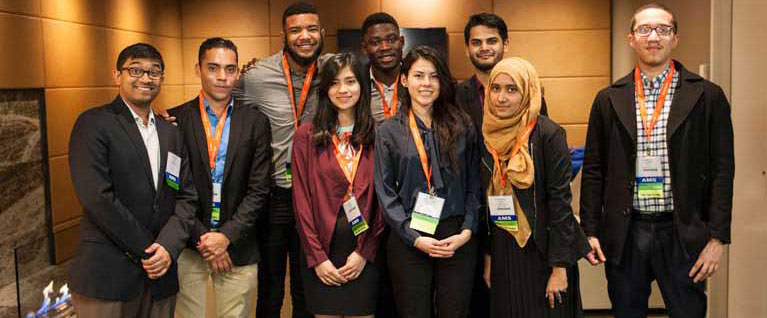
AMS Early Career Leadership Academy (ECLA) holds two days of face-to-face sessions this week. From the looks of the final agenda, the event promises to be life-changing for the participants. Kudos to the sponsors and program organizers… you’ve set something powerful into motion!
A small contribution to the occasion (akin to the party-favor you might find by your place setting), this in the form of a question for each participant:
How might I make better use of questions in my life?
Okay, Bill: here’s a question for you… what on Earth do questions have to do with leadership?
Well, it turns out that management/leadership experts seem to agree that leaders make important contributions to their organization or community by asking questions.
Also happens, though, that the same gurus differ widely in their suggested framing of those questions. Consider these two examples:
- Is there a simpler solution or simpler way of doing this?
- Can you explain the solution to me?
- What should we stop doing?
- Is this urgent or important?
- Do you think our approach will be successful?
- What does success look like?
- What’s holding us back?
- Who has experience with this?
- What’s the climate here?
- What if this setback is really an opportunity in disguise?
- What hasn’t been achieved yet?
These weren’t chosen randomly; they just happened to be the first two that popped up on a google search. You can take a look for yourself and uncover millions (literally) of alternative question sets. Perhaps you see elements in these two (or some other) lists to admire; more likely you quickly start seeing ways they can be improved upon. Perhaps they seem too bland, or generic… or just slightly misdirected…
That’s the point. You don’t want to adopt someone else’s list; you want to formulate your own.
Do this with some care and thought. Craft an initial set and then revisit and refine it from time to time. Over a period of years, you’ll realize you’ve created a guide, a lodestone, a compass (insert your own metaphor here) that is helping you set the course of your life’s work – equipping you to distinguish between what’s vital and enduring and what’s merely urgent and fleeting, between what matters and what’s irrelevant; to tell the difference between opportunity and distraction.
Wouldn’t ask you to do anything I haven’t done myself, so here’s…
My list of questions appears on the masthead of Living on the Real World. First formulated these thirty years ago, listening to conversations at the nascent stages of what is today’s full-throated climate-change debate, discussions of sustainability, and related issues. Had the naïve/grandiose idea that they’d make a great frame for a worldwide conversation to celebrate the run-up to the millennium – the year 2000.
We all know that didn’t happen!
More recently (and with humbler aspirations), in 2010, they seemed to provide a useful frame for the blog.
What kind of world is likely if we take no deliberate action? This is a science question – not just an Earth sciences question, but rather one that has three dimensions. Where is the natural world – the world of resources, extremes, landscape, environment, biomass and biodiversity – trending? In what ways is it degrading? I what respects might it be becoming more robust? What about the social world – the world of seven+ billion people? Are we growing more urbanized? Richer or poorer? Equitable or unfair? Peaceful or fractious? And finally what about our spiritual world? Are we suppressing our spiritual side, or allowing it to flower? Do we celebrate its diversity, or do we all tend to shoehorn it into something narrow, monochromatic?
What kind of world do we want? This is a social question, a societal question, a question for everyone, not just for scientists. The question clearly has no answer, yet it deserves ongoing attention. That emphasis extends to figuring out how we engage each other on this issue. How do we keep discussion from morphing into debate, and debate from degrading into polarization and dysfunction? And keep in mind this question also has the same three dimensions: what kind of “natural” world do we want? What kind of social world would be desirable? What kind of spiritual world suits?
(A google search doesn’t back this up but) I was once told that George Bernard Shaw said, “if you have everything you want, you might as well be dead.” So, we’re not likely to ever “get what we want.” This will always be a journey. That brings us to the third question:
What kind of world is possible if we act effectively? What’s achievable? What represents a step or steps in the right direction? What can I, or my community, or my organization, do next? How do I translate thought into action?
Regardless of your background, somewhere along the line a teacher or professor asked you to write a paper or thesis, and asked you to start with some articulation of “what question am I trying to answer?” That wasn’t just an idle academic exercise. The teacher was trying to equip you for life… for life as a leader. So, if you’re an ECLA participant and have already framed such questions as a guide to living and leading, use this ECLA event as a chance to reexamine them, refresh them. If you haven’t got a pre-existing list, develop a prototype list while you’re here.
Even if you’re well past the ECLA stage, or not directly involved (remember, seven billion people fall into this category) give your life questions another look, and in the process make your day and your relationships and your work just that much more meaningful and effective.
And remember, it’s not just about you. When you do this, you make life better for the rest of us as well. Thank you!
